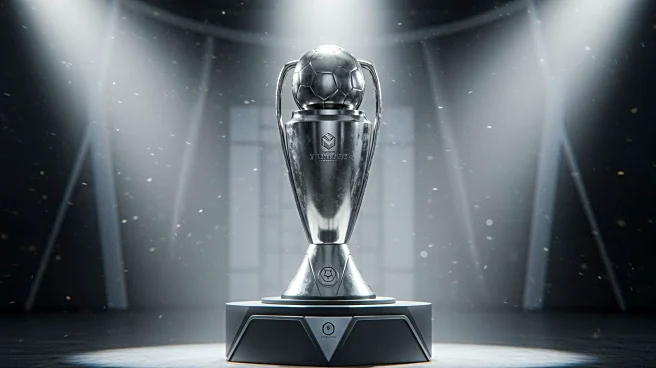What is the story about?
What's Happening?
The organizing committee for the Los Angeles Olympics has announced plans to sell naming rights for several venues in the 2028 Games. This decision marks a significant shift from the International Olympic Committee's traditional policy of keeping brand names off arenas and stadiums. Contracts have already been secured with Honda and Comcast, which will have naming rights for the volleyball arena in Anaheim and the temporary squash venue, respectively. LA28 chairman and CEO Casey Wasserman emphasized that the revenue generated from these deals will exceed the current $6.9 billion budget for the Games. The move is seen as a necessary step for Los Angeles, as the core costs of the Games are not backed by government funding, unlike other host cities. Wasserman explained that the naming rights are part of the American sports lexicon, citing examples like the Crypto.com Arena, which will host gymnastics and boxing events.
Why It's Important?
This development is crucial as it represents a paradigm shift in how Olympic Games are funded, particularly in the United States. By selling naming rights, the Los Angeles Olympics can secure additional revenue streams, reducing the financial burden on the city and taxpayers. This approach could set a precedent for future Olympic Games, especially in countries where government funding is limited. The decision also highlights the unique position of Los Angeles as a private enterprise responsible for delivering the Games, necessitating innovative funding strategies. The involvement of major sponsors like Honda and Comcast underscores the commercial potential of the Olympics and the growing influence of corporate partnerships in sports.
What's Next?
The organizing committee plans to offer naming rights for up to 19 temporary venues, with the IOC's top sponsors having the first opportunity to secure deals. However, iconic venues like the LA Coliseum, Rose Bowl, and Dodger Stadium will not be part of this arrangement due to IOC rules prohibiting advertising on the field of play. The committee will continue to negotiate with potential sponsors, aiming to maximize revenue while adhering to IOC guidelines. Additionally, the Games will feature the return of softball and baseball, and the introduction of flag football, reflecting Los Angeles' ability to innovate within the Olympic framework.
Beyond the Headlines
The decision to sell naming rights may have broader implications for the cultural and ethical dimensions of the Olympics. It raises questions about the commercialization of sports and the balance between tradition and modernity in global events. As Los Angeles reshapes the Olympic brand, it could influence how future host cities approach funding and sponsorship, potentially leading to more privatized and commercially driven Games. This shift may also impact the perception of the Olympics, as corporate influence becomes more visible in the branding and presentation of the event.
















